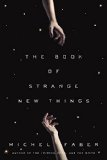Summary | Excerpt | Reading Guide | Reviews | Beyond the Book | Readalikes | Genres & Themes | Author Bio

A Novel
by Michel Faber
Having found it again, he perused the timetable posted on the door in case he'd arrived just in time for a rare Communion. But the next one wasn't scheduled till Thursday afternoon at three, by which time he would be an unimaginable distance away from here, and Beatrice would have started her long months of sleeping alone with Joshua.
He pushed the door open gently. The three Muslims kneeling inside didn't acknowledge him as he walked in. They were facing a piece of paper attached to the wall, a computer-printed pictogram of a large arrow, like a traffic sign. It pointed to Mecca. The Muslims bowed, thrusting their rumps in the air, and kissed the fabric of the brightly-colored mats provided. They were immaculately dressed men, with expensive watches and bespoke suits. Their polished patent-leather shoes had been tossed aside. The balls of their stockinged feet squirmed with the enthusiasm of their obeisance.
Peter cast a quick glance behind the curtain that divided the room down the middle. As he'd suspected, there was a woman there, another Muslim, shrouded in gray, performing the same mute ritual. She had a child with her, a miraculously well-behaved boy dressed like Little Lord Fauntleroy. He was sitting near his mother's feet, ignoring her prostrations, reading a comic. Spider-Man.
Peter walked over to the cabinet where the Holy Books and pamphlets were kept. The Bible (a Gideon edition), a separate New Testament and Psalms, a Qur'an, a tatty book in Indonesian that was probably another New Testament. Stacked on a lower shelf, next to the Watchtower and the Salvation Army newspapers, was an optimistically large pile of leaflets. The logos looked familiar, so he bent down to identify them. They were from a very large American evangelical sect whose London pastor had been interviewed for this same mission. Peter actually met him in the USIC foyer, leaving in a huff. "Bunch of time-wasters," the guy hissed as he headed for the exit. Peter had expected to be unsuccessful too, but instead . . . he had been chosen. Why him and not someone from a church with loads of money and political clout? He still wasn't sure. He opened one of the leaf- lets, immediately saw the usual stuff about the numerological significance of 666, barcodes and the Whore of Babylon. Maybe that was the problem right there: fanaticism wasn't what USIC was looking for.
The quiet of the room was interrupted by an intercom message, piped through a small speaker attached, limpet-like, to the ceiling. "Allied Airlines regrets to announce that there has been a further delay to Flight AB31 to Alicante. This is due to technical problems with the aircraft. The next announcement will be made at 22:30. Any remaining passengers who have not yet picked up their meal vouchers are requested to do so. Allied Airlines would like to apologize once again for any inconvenience."
Peter fancied he could hear a collective moan of lamentation start up outside, but it was probably his imagination. He opened the Visitors Book and leafed through its ledger-size pages, reading the comments scribbled one beneath the other by travelers from all over the world. They didn't disappoint him; they never did. Today's entries alone filled three pages. Some were in Chinese characters, or Arabic script, but most were in English, halting or otherwise. The Lord was here, poured forth in this welter of biro ink and felt-tip pen.
It always struck him, whenever he was in an airport, that the entire, vast, multi-storied complex pretended to be a playground of secular delights, a galaxy of consumerism in which religious faith simply did not exist. Every shop, every billboard, every inch of the building right down to the rivets and the toilet plugholes, radiated the presumption that no one had any need for God here. The crowds that queued for snacks and knick-knacks, the constant stream of passengers recorded by the closed-circuit TVs, were wondrous proof of the sheer variety of human specimens, except that they were presumed to be identically faithless inside, duty-free in every sense of that word. And yet these hordes of bargain-hunters, honeymooners, sunbathers, business executives preoccupied with their deals, fashionistas haggling for their upgrades . . . no one would guess how many of them ducked into this little room and wrote heartfelt messages to the Almighty and to their fellow believers.
Excerpted from The Book of Strange New Things by Michel Faber. Copyright © 2014 by Michel Faber. Excerpted by permission of Hogarth Books. All rights reserved. No part of this excerpt may be reproduced or reprinted without permission in writing from the publisher.
Your guide toexceptional books
BookBrowse seeks out and recommends the best in contemporary fiction and nonfiction—books that not only engage and entertain but also deepen our understanding of ourselves and the world around us.